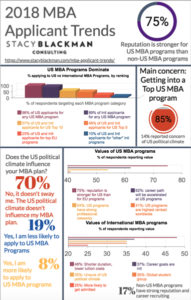MBA Candidates Are Unswayed by the Disruptive U.S. Political Climate
 The current U.S. political and economic climate does not play a significant role in MBA candidates’ decision of where to study, according to an annual survey by Stacy Blackman Consulting, a leading business school admissions consulting firm. This year 70% of respondents were unswayed by the disruptive U.S. political climate, and 8% were more likely to apply to U.S. MBA programs.
The current U.S. political and economic climate does not play a significant role in MBA candidates’ decision of where to study, according to an annual survey by Stacy Blackman Consulting, a leading business school admissions consulting firm. This year 70% of respondents were unswayed by the disruptive U.S. political climate, and 8% were more likely to apply to U.S. MBA programs.
In addition, among the 22% who reported they were less likely to apply because of the current U.S. climate, 82% of that group is still applying to U.S. MBA programs anyway.
The Survey findings suggest that the so-called “Trump effect” that is often attributed to falling application volume at U.S. business schools is having little impact on the top-tier MBA programs, such as Harvard Business School or Wharton.
Instead, MBA candidates were far more concerned about getting into a top U.S. MBA program (85% said this was a concern), funding their MBA (59%) and writing a high-quality application while working (51%). Recruiting post MBA, at 36%, and the U.S. political climate, at 14%, were not major concerns.
Reputation is a key indicator:
Reputation remains a key priority for business school applicants applying to all MBA programs. 75% of respondents said that reputation is stronger for U.S. MBA programs than international programs and that 75% value was consistent between international and US respondents. The ability to accelerate career paths and improve professional networks in the U.S were additional advantages of U.S MBA programs, according to the Survey results.
Irrespective of the U.S. political and economic climate, reputable MBA programs are highly coveted, with strong preferences among all MBA candidates for the top-10 business schools in the U.S. 57% of respondents, U.S. and international, are applying to the top-10 U.S. MBA courses.
Overall, 88% of U.S. respondents and 54% of international respondents were applying exclusively to U.S. MBA programs of any rank. Most international applicants cast a wider net due to the competitive admissions process of the top U.S. MBA programs.
“MBA applicant demand directly relates to a business school’s reputation and brand,” said Esther Magna, Principal at Stacy Blackman Consulting.
“As a result, top MBA program brands, including Harvard and Wharton, will likely see a smaller decrease in applicant volume, whereas less-regarded MBA programs will experience a greater decrease in applicant volume in this very strong US economy, which tends to reduce demand for MBA education.”
U.S. MBA programs of any rank are significantly more popular than European, or other non-US programs, among survey respondents. 4% of international respondents are applying to European MBA programs, and are not applying to U.S. programs.
The majority of the international applicants who apply to European courses are also applying to U.S. programs. Most candidates who were applying to European MBAs, such as at INSEAD or London Business School, said that the shorter duration and lower tuition costs were among their key priorities.
“Applicants see an MBA as a long-term investment in their future,” said Beth Tidmarsh, a former Kellogg School MBA Admissions Officer, now on the Stacy Blackman Consulting team.
“Thus, the long-term brand reputation and credentials of a top tier b-school are appealing, and international candidates may be willing to overlook the temporary political environment. The top-tier schools are coveted because the value of the education translates back to many countries.”
The survey found that 69% of respondents believe there will be fewer international students within U.S. MBA programs in the current political climate. In addition, 47.1% believe there will be reduced recruiting options for international MBA candidates at U.S. business schools.
However, only 37.95% of survey respondents indicated that it was “very important” to have a highly diverse (40% international) MBA cohort. As one US-based respondent said: “International student representation is important, but more than 25% is not necessary.”
Additional key findings
Respondents surpassed 500 total. 46% were U.S. citizens applying for MBA programs and 54% were internationals. Additionally, 37% of the respondents were female, 61% male, and 2% unspecified. International respondents included 28% Indian Nationals and a mix from Asia, Europe, Middle East, South America, Africa and Canada.
About Stacy Blackman Consulting
Stacy Blackman Consulting (www.StacyBlackman.com) has helped clients gain admission to every top business school in the world. With a world-class team of consultants, the firm applies a personalized approach to each applicant, based on developing and implementing a winning marketing strategy to make the application process less stressful, and more successful.

